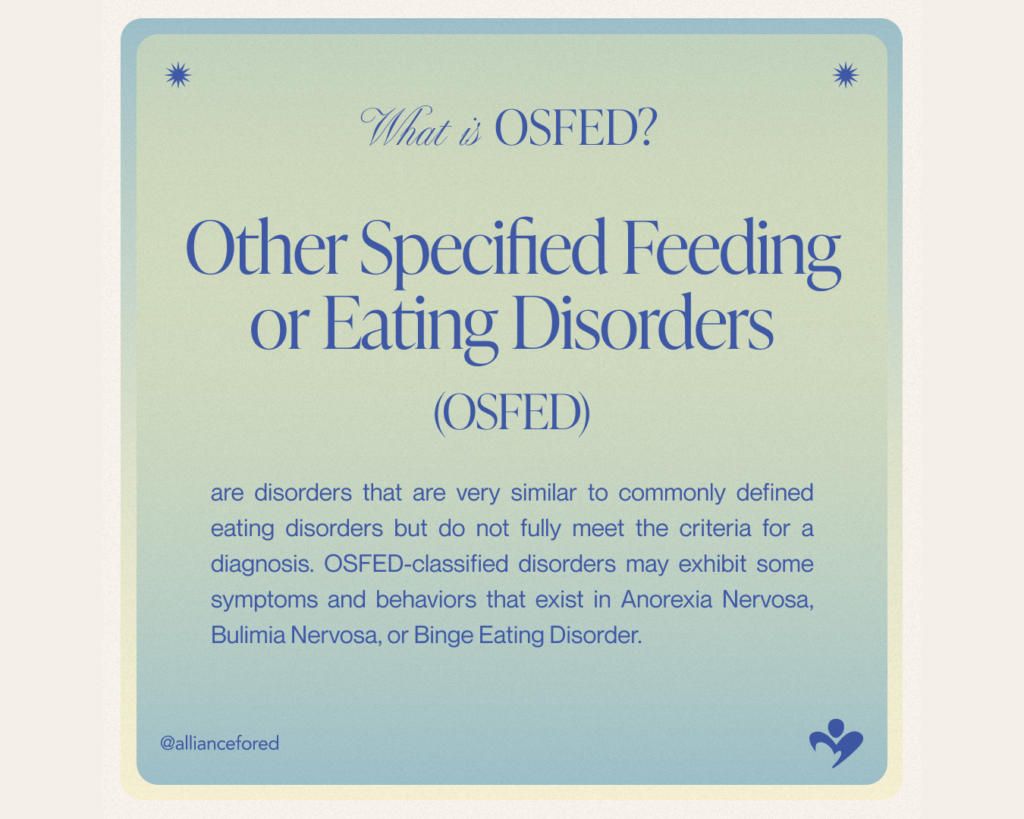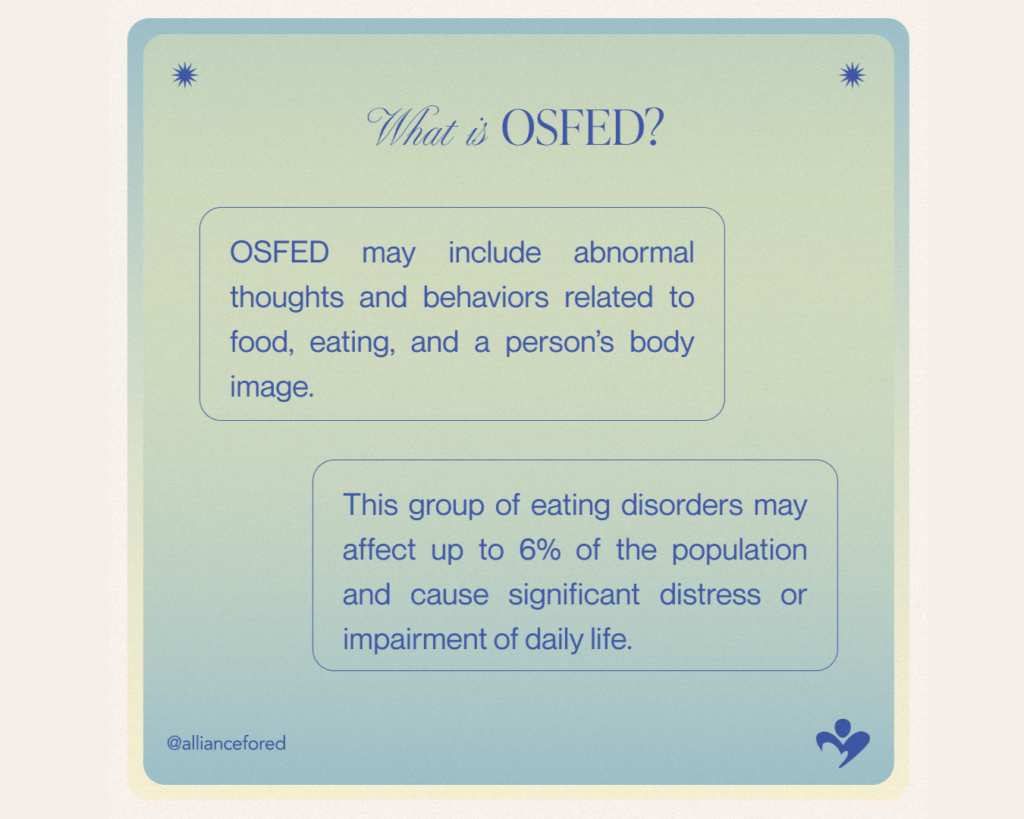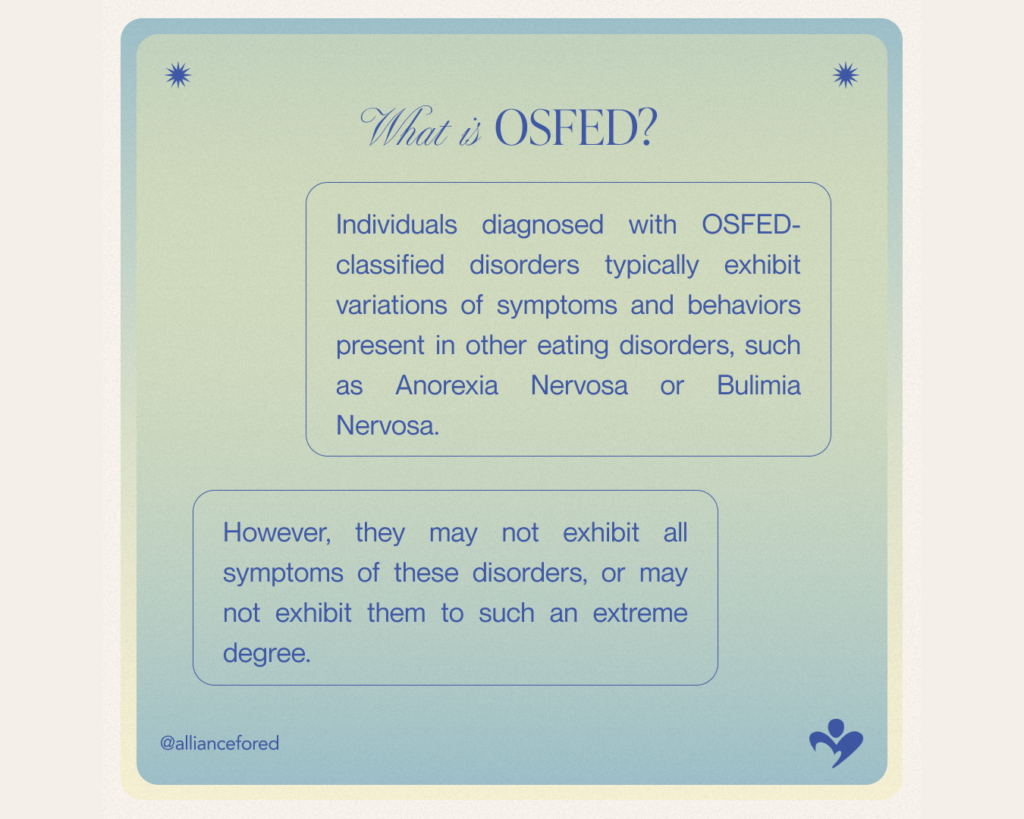Many people struggle with eating disorders. Commonly understood diagnoses like anorexia nervosa or bulimia nervosa account for many cases of eating disorders that impact daily life and well-being of affected individuals. But, what if you have symptoms that don’t quite fit the full criteria of those conditions? It’s time to learn more about OSFED, or Other Specified Feeding and Eating Disorders.
What is OSFED
Other Specified Feeding and Eating Disorder, known as OSFED, is a classification of eating disorders for those with conditions that do not meet the diagnostic criteria of other EDs. OSFED was previously known as Eating Disorder Not Otherwise Specified (EDNOS) in the Diagnostic and Statistical Manual of Mental Disorders (DSM-4). It is the most commonly diagnosed eating disorder for both adolescents and adults. A person with OSFED may exhibit many symptoms of disordered eating similar to conditions such as anorexia nervosa or bulimia nervosa, but will not meet the entire criteria necessary to be diagnosed with these conditions. Nevertheless, OSFED is a serious and dangerous condition with potentially severe health impacts that require treatment.
Symptoms and Signs
Those who are experiencing OSFED may show symptoms similar to other eating disorders. This can include disordered thoughts regarding food and eating, atypical eating behaviors, and preoccupation with body image. OSFED may also co-occur with other mental health problems.
Common symptoms may include:
- Depression and anxiety
- Fixation on food and eating
- Fixation on weight
- Severe discontent with body image
- Refusal to eat particular food categories
- Low self-esteem
Some behavioral cues may include:
- Weight loss
- Controlling food behaviors
- Distorted body image
- Evidence of binge eating and/or purging
- Frequent dieting
- Excessive exercise
Some physical signs of OSFED include:
- Menstrual irregularity
- Problems sleeping
- Dizziness and fainting
- Muscle weakness and lethargy
- Reduced immune response
This is not an exhaustive list of signs and symptoms. Many of the symptoms attributed to OSFED also present in other eating disorders, and vice-versa, so it is important to seek support and treatment if you or a loved one experiences these symptoms.
Causes
As one of the most common eating disorders, OSFED can be caused by a wide variety of factors. These causes vary by case based on personal medical history and environment. First, genetic predisposition to eating disorders may be a cause of OSFED. If someone in your family has experienced an eating disorder, your likelihood of developing OSFED may increase. Family medical history, along with social and cultural factors, can play a significant role in developing OSFED and other eating disorders. All eating disorders, including OSFED, commonly co-occur with other mental health conditions, such as anxiety and depression, as well as trauma.

Diagnosis Examples
A common misconception is that someone diagnosed with OSFED has a less severe or harmful eating disorder than those diagnosed with other conditions such as anorexia nervosa or bulimia nervosa. However, a diagnosis of Other Specified Eating and Feeding Disorders (OSFED) is serious and requires treatment and medical care just like any other eating disorder.
People diagnosed with OSFED generally show symptoms and behaviors present in other eating disorders, but to a lesser degree or lower frequency. Low frequency and limited duration of these symptoms can nevertheless be clinically significant and cause function impairment to the individual experiencing them. There are currently five diagnostic categories of OSFED.
- “Atypical” anorexia nervosa: An individual with this condition will likely present all the symptoms of anorexia nervosa, but their body weight is within or above the normal range. Signs may include fixation on food and body image, restricting food intake, preoccupation with weight gain, and disordered rituals around food and meals.
- Binge eating disorder (of low frequency or limited duration): An individual experiencing this condition will likely present all the symptoms of binge eating disorder, however binge eating episodes occur less than once per week and/or last for less than three months. Signs of binge eating disorder may be eating large quantities of food, reduced fullness signaling, and eating until discomfort or pain arise.
- Bulimia nervosa (of low frequency or limited duration): Someone experiencing this type of OSFED may exhibit all the signs of someone struggling with bulimia nervosa, but the bingeing and purging behaviors occur with less frequency and/or for less than three months. Signs of bulimia nervosa may include eating large quantities of food or extreme exercise habits.
- Purging disorder: Individuals experiencing purging disorder may show habits of repeated purging behaviors without binge eating. Excessive exercise, misuse of laxatives or other diuretics, and self-induced vomiting are common forms of purging. Signs of this condition are fear of weight gain, repeated episodes of purging with the goal of weight loss, and dysmorphic body image.
- Night eating syndrome: Those experiencing night eating syndrome exhibit excessive eating habits after an evening meal or after waking up from sleep. Signs of this condition are unmanageable urges to eat between dinner and sleep, disrupted sleeping patterns, and waking up to eat throughout the night.
Though OSFED can present in many different ways, there is a commonality of disordered thoughts and behaviors regarding food and eating in each of these five diagnostic categories. If you or someone you love is experiencing these thoughts and behaviors, it is important to get help now.
Risks and health impacts
The risks associated with OSFED are severe and can lead to dangerous health complications. Just because those experiencing OSFED may exhibit disordered behaviors to a lesser degree or at a lower frequency does not preclude these individuals from the dangers associated with eating disorders. Medical complications, such as chronic gastrointestinal issues, heart problems, menstrual irregularity, organ dysfunction, infertility, and osteoporosis are all potential outcomes of Other Specified Feeding and Eating Disorders (OSFED). Many individuals diagnosed with OSFED also experience psychological health impacts as well. These include feelings of shame and guilt, self-harm, substance misuse and addiction, depression, and anxiety. These risks and health impacts can be minimized with prompt professional treatment of OSFED.
Treatment
It is important to remember that OSFED is a serious health concern. Because many of the symptoms of OSFED do not fit into the more well-known categories of eating disorders, or do not meet the full criteria of other diagnoses, many people struggling with OSFED go untreated or unnoticed by family and friends. Nonetheless, it is a real and serious eating disorder that requires the same attention and treatment as other eating disorders.
For those living with OSFED, recovery is possible. Effective treatments are available to help manage the eating disorder, co-occurring mental health problems, and the various health risks associated with OSFED. The particular eating disorder treatment strategy will be formulated by a care team and determined based on the diagnostic category in which the patient falls. Many different psychological therapies have been found effective in treating OSFED, such as cognitive behavioral therapy (CBT), acceptance and commitment therapy (ACT), and dialectical behavior therapy (DBT). If there are significant medical or psychiatric concerns, a higher level of care, such as inpatient treatment, may be necessary.
Seek Help
If you or a loved one is experiencing Other Specified Feeding or Eating Disorders (OSFED), or any of the signs and symptoms listed above, you are not alone. Recovery is possible and help is available with the National Alliance for Eating Disorders.




